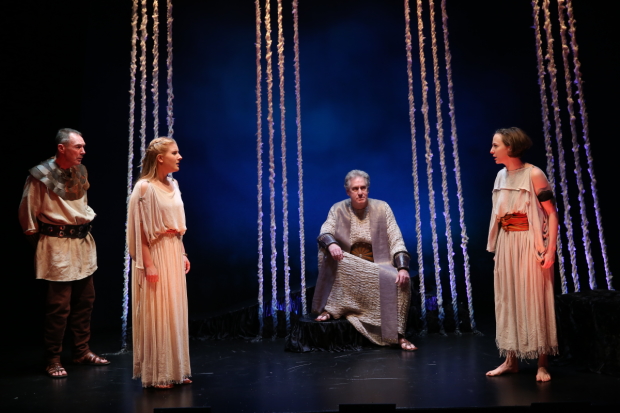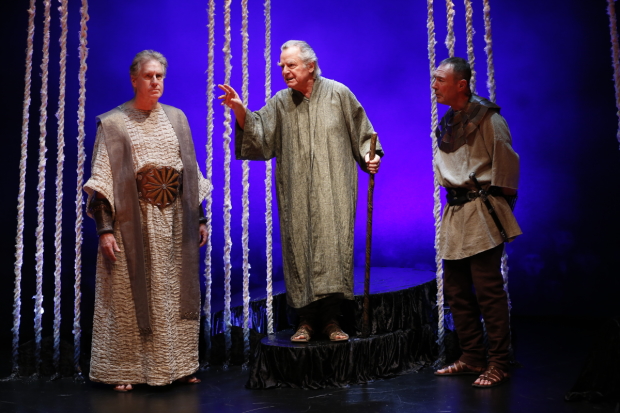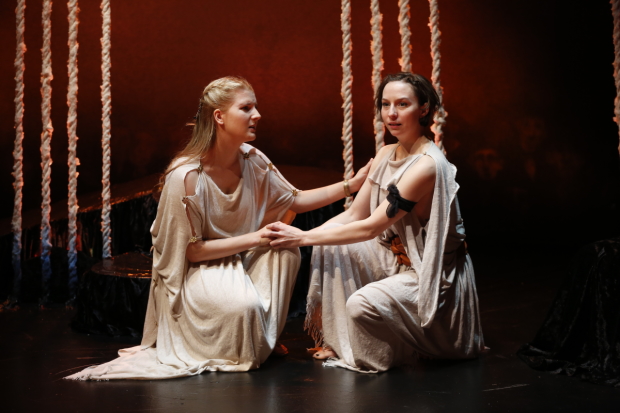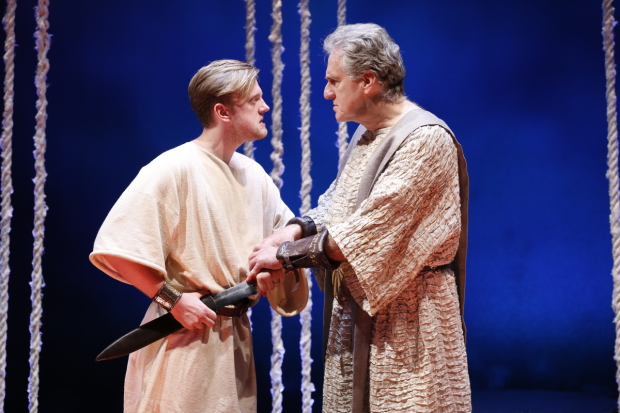The Burial at Thebes
Irish playwright Seamus Heaney suggests a kindred spirit between George W. Bush and an ancient Greek tyrant.

(© Carol Rosegg)
The playwright may not be the God of the theater, but he certainly wields an inordinate amount of power over the fate of a production. Such is the case with The Burial at Thebes, the late Seamus Heaney's adaptation of Sophocles' Antigone. It is now receiving its first major New York City production with Irish Repertory Theatre at the DR2 Theatre (the play officially debuted in the city during a brief 2006 off-off-Broadway run with the now-defunct Handcart Ensemble). While the Irish Rep's take eschews the half-face masks of that earlier production, it feels no less cold and distant, strongly suggesting that this tone comes baked into the text.
The play begins at the end of the Theban civil war. The two sons of Oedipus, Eteocles, and Polyneices have killed each other in combat, leaving their uncle, Creon (Paul O'Brien), in command of the city. He has decreed that Eteocles (who defended the city from attack) get a hero's burial, but that Polyneices (the attacker) be left to rot in the Mediterranean sun. He further rules that anyone who defies this order be put to death. Surviving sister Antigone (Rebekah Brockman) disobeys Creon anyway so that Polyneices can pass to the underworld in peace. Creon angrily enforces his law, entombing Antigone alive. This is a particularly fraught decision since she is betrothed to his only son, Haemon (Ciarán Bowling). Blind prophet Tiresias (the eerie and sage-like Robert Langdon Lloyd) cautions that this course of action can only anger the Gods, but Creon remains unmoved. He hurtles toward the play's tragic conclusion with an overpowering hubris, that most classical of fatal flaws.

(© Carol Rosegg)
Although written in 2004, the play generally proceeds in a manner consistent with an ancient Greek drama: There are extended monologues about the exciting things happening offstage, moralistic proclamations from the chorus, and oodles of self-pity from the principal players. It's hard to see what new revelations Heaney has brought to Antigone. While the Nobel laureate has an immense talent for imagery (particularly when it comes to the subject of bird droppings, described several times in vivid detail), it feels like pretty window dressing on an old house. In lieu of offering a deeper understanding, Heaney has taken Sophocles' 2,500-year-old family-versus-state drama and turned it into a polemic against the George W. Bush administration, which, in the process, saps it of all nuance.
Heaney was clear about the fact that one of his motivations in adapting this well-worn play was the parallel between Creon's obstinacy and President Bush's with-us-or-against-us approach to the Iraq War. No matter how wrong Creon is he continues to double-down on his bad decisions until it is too late. "Modern audiences are more sympathetic to Antigone's defiant embrace of the law of the gods," Heaney confidently wrote in 2004, a time when international opposition to the war was at an all-time high. Yet it's hard to see how contemporary theatergoers could have much compassion for a character that is essentially a highborn religious fanatic.

(© Carol Rosegg)
Brockman's wild-eyed portrayal of Antigone (the one thing keeping this play from being entirely one-sided) smacks of an American-born ISIS bride. She's whiny and entitled (as one would expect from a princess), coloring her royal privilege with a deep shade of martyrdom. "There's nothing, sister, nothing / Zeus hasn't put us through / Just because we are who we are — / The daughters of Oedipus," she tells her sister Ismene (Katie Fabel), shaking with indignation. Later, she practically salivates at the thought of joining the righteous in the underworld. This Antigone is a tragic heroine that only an incipient suicide bomber could love.
That's not to say that we reactively join Team Creon. O'Brien (who valiantly ascended the throne when the previously announced kings, John Cullum and Larry Bryggman, abdicated in quick succession) easily captures the theatrical bluster and hasty resolve of "the decider." His paternal machismo fits perfectly with Heaney's blunter lines: "Son, you're pathetic. You give in to a woman," he tells Haemon with a scoff after the son pleads for Antigone's life.

(© Carol Rosegg)
Unfortunately, that's as hot-blooded as the exchanges ever get. Not that she has much to work with, but Charlotte Moore directs the piece with a startling lethargy. Her blocking on the cozy DR2 stage suggests claustrophobia. Late in the play, Haemon casually moseys onstage, looking nothing like a man whose fiancée is about to die of forced starvation. Other characters stand to the side and stare out at the audience, like lesser runway models making way for Naomi Campbell.
Costume designer Linda Fisher outfits the cast in Greek-y robes. The women wear flowing white dresses with gold clasps, looking like they're ready for a night out at Studio 54 circa 1978. But instead of doing the hustle, they lounge on Tony Walton's bafflingly inactive set: a few raised obsidian platforms garnished by synthetic black bed skirts. Frayed ropes extend from the rafters like beams of light from heaven. They are never utilized or acknowledged by the actors.
Despite the impracticality of his set, Walton does give us the one lasting image of the production: A painted backdrop of pale and sunken proletarian faces (looking very much like the work of Edvard Munch) keeps vigilant watch on the stage. These are the commoners who have to live with the consequences of the power struggle between an entrenched aristocracy and a bull-headed strongman. In this election year, it's a painfully astute scene, far more compelling than the sleepy drama in Heaney's text.









